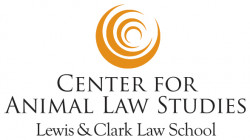Expanding the Reach of Animal Law in New Zealand
Bianka Atlas (’20, LLM, New Zealand) shares how she’s expanding the field of animal law in New Zealand for her Global Ambassador Project.
Open gallery

As a proud Lewis & Clark Animal Law LLM alumna and Center for Animal Law Studies (CALS) Ambassador, I am delighted to dedicate my GAP year to establishing an animal law and policy organisation in New Zealand.
At the core of this initiative lies a commitment to effect meaningful change for all animals – in New Zealand and globally. The organisation will serve as a platform for research, scholarship, education, and advocacy, with the overarching goal of improving the status of animals. By fostering interdisciplinary dialogue and collaboration, I aim to increase public awareness of animal issues, and promote a deeper understanding of the interconnectedness of human, animal, and environmental health, while also advancing animal law as a discipline.
Founding a new nonprofit
Building a new nonprofit from scratch is a bold initiative and one that requires many foundational steps. I have been doing that work throughout my time as a CALS Ambassador.
A pivotal aspect of creating the organisation is the establishment of a professional brand identity that embodies my values and aspirations in the field of animal law. My aspirations for my new nonprofit include: advocating for and raising awareness about issues facing animals, especially those animals who tend to be “invisible” or receive comparatively little attention; driving systemic change in the legal status and treatment of animals; and using the law strategically and creatively to achieve justice for all animals. The organisation will reflect the values of compassion, integrity, credibility, and evidence-based advocacy.
Working closely with a web designer, I am developing a logo and a website, which will serve as a hub for advocacy, education, and fundraising. This online platform will broaden the reach of the organisation, facilitate engagement and collaboration with others, and provide a space for potential donors and supporters to contribute to the cause. I will be incorporating the nonprofit and seeking charitable status for a trust or not-for-profit company to enable fundraising to support the organisation.
Understanding the importance of engaging diverse stakeholders, I have carefully defined the organisation’s target audience. While my primary focus is on academia, media, funders, and potential partners, I also recognise the importance of reaching out to businesses involved in animal industries and the general public. By tailoring messaging to resonate with these diverse audiences, I aim to build a broad coalition of support for the organisation’s initiatives.
Projects underway
While progress on setting up the organisation continues, I have been actively engaged in several related projects. These include publishing news articles and opinion pieces on significant developments, such as the recent dog meat ban in South Korea. While acknowledging the importance of this milestone, which will end the breeding, slaughter and sale of dogs for their meat by 2027, my article urges a broader conversation that considers the largely unquestioned slaughter of billions of other animals for food every year. The article touches on the concept of speciesism which, I explain, results in the differential treatment of animals simply because of their membership of a particular group; an ideology that considers the lives and interests of some animals (or, often, all non-human animals) as less important or deserving of respect, simply because they belong to another species.
I have also initiated a Parliamentary petition to ban the import and sale of foie gras in New Zealand. The petition is a vehicle to raise awareness about the inhumane production methods of this ‘luxury’ product, as well as to highlight the double standard in allowing the import and sale of a product obtained using practices likely to be prohibited in New Zealand. Arguing that the import and sale of foie gras undermines and is inconsistent with the spirit of New Zealand’s Animal Welfare Act, the petition calls for legislation prohibiting the import and sale of this product.
Such projects underscore my dedication to advocating for animals in New Zealand and internationally, and serve as precursors to the broader initiatives I envision undertaking through the organisation.
Conclusion
I am deeply grateful to CALS for recognising the potential of my GAP project, and for their continued and steadfast support. I am excited about the upcoming launch of the organisation, through which I look forward to continuing my work to help ensure animals receive the legal protections, and are treated with the dignity, they deserve.

About Bianka: Bianka is a passionate advocate for systemic change that improves protections for animals. She is the first New Zealander to graduate with an Animal Law LLM from Lewis & Clark Law School’s Center for Animal Law Studies, where she was the Brooks Institute for Animal Rights Law and Policy International Scholar. Bianka has researched and published on a range of animal law issues, including international wildlife law, aquatic animal protection, the live animal export trade, and the link between domestic violence and animal abuse. Bianka enjoys engaging with the global animal law community and working collaboratively to use the law strategically and creatively to achieve justice for all animals.
The Center for Animal Law Studies (CALS) was founded in 2008 with a mission to educate the next generation of animal law advocates and advance animal protection through the law. With vision and bold risk-taking, CALS has since developed into a world-renowned animal law epicenter. CALS’ Alumni-in-Action from over 25 countries are making a difference for animals around the world. CALS is a nonprofit organization funded through donations and grants.
More Center for Animal Law Studies Stories
Center for Animal Law Studies is located in Wood Hall on the Law Campus.
MSC: 51
email cals@lclark.edu
voice 503-768-6960
Center for Animal Law Studies
Lewis & Clark Law School
10101 S. Terwilliger Boulevard MSC 51
Portland OR 97219


